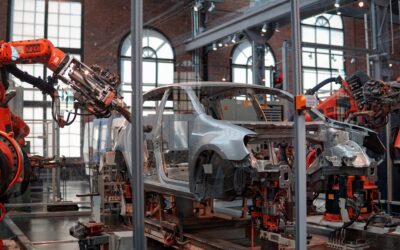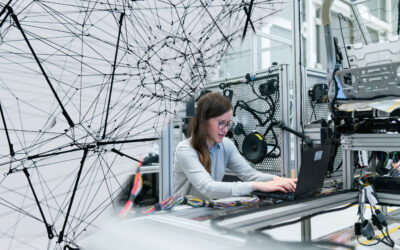Hardly any other topic is as important in research at the moment as artificial intelligence. What sounded like science fiction ten years ago has long since become reality. Robots perform tasks autonomously and adapt to their tasks more and more thanks to various methods such as machine learning, deep learning and co.
New opportunities through the use of artificial intelligence
This use of artificial intelligence offers many opportunities, especially for companies in the areas of image recognition and process automation. Through the learning ability of AI, tasks can be automated – and with the highest precision. The areas of application are versatile. From services to mechanical engineering, AI offers great automation potential in almost all economic sectors. Especially for small and medium-sized enterprises (SMEs), an AI implementation offers higher process speeds and new possibilities for quality inspection in product manufacturing.
For example, an AI-based system can inspect parts automatically and achieve a detection rate of up to 100%. A human, on the other hand, often only achieves up to 70% in monotonous work steps.
This difference results accordingly in higher customer satisfaction, for example through increasing product quality and a reduction in unit costs.
The use of AI in Germany
These positive economic influences not only affect individual companies, but also make an overall economic contribution to Germany as a whole. Last but not least, the Federal Republic is among the top 5 most automated countries in the world in terms of robot density. The number of industrial robots sold here in 2018 rose by 26% compared to the previous year, confirming the upward trend in automation.
However, a study by the German Federal Ministry for Economic Affairs and Energy shows that an increase in AI use is still possible. It must be taken into account in which sectors an introduction to the topic of artificial intelligence makes sense. Currently, the greatest potential lies in the IT and service sectors, but also in industry, such as automotive or mechanical engineering. However, the world of work is also changing in the course of digitalisation and it is therefore not inconceivable that new opportunities will also arise in other sectors in the future.

AI heralds a new era of innovation
One of the greatest opportunities of artificial intelligence, however, is its innovative power. A study by HYVE even posits that AI is ushering in a new era of innovation.
In fact, companies using AI are achieving significantly higher turnover and turnover shares with market innovations. A large part of this is driven by SMEs. These new developments have become extremely important, especially as a result of globalisation. The Asian region in particular is exerting great pressure on European industry to remain competitive.
The assumption that process automation will lead to job losses is also countered by these innovations and fields of work: For the use of AI requires skills that require new employees or the entering into new cooperations. For example, it makes sense for a mechanical engineering company to cooperate with experts in the field of AI and image processing in order to successfully introduce automation.
Digitisation also in the future
The use of AI therefore offers companies many opportunities and makes a significant contribution to economic success. The size of the company plays a rather secondary role here. Even small and medium-sized companies can benefit from the introduction of artificial intelligence. In order to be able to use these opportunities, the involvement of specialists in the field and a thorough examination of the topic is a prerequisite. Because with digitalisation, the world of work is also constantly evolving. The fact that this process is happening is no longer a question. However, whether one experiences this time as a designer or an observer is decisive for competition.



